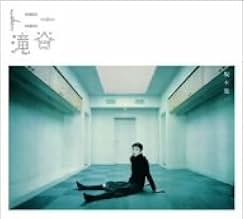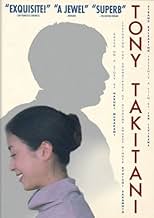Tonî Takitani
- 2004
- 1 h 15 min
AVALIAÇÃO DA IMDb
7,2/10
5,2 mil
SUA AVALIAÇÃO
Adicionar um enredo no seu idiomaWhen technical illustrator Tony Takitani asks his wife to resist her all-consuming obsession for designer clothes, the consequences are tragic.When technical illustrator Tony Takitani asks his wife to resist her all-consuming obsession for designer clothes, the consequences are tragic.When technical illustrator Tony Takitani asks his wife to resist her all-consuming obsession for designer clothes, the consequences are tragic.
- Direção
- Roteiristas
- Artistas
- Prêmios
- 2 vitórias e 7 indicações no total
- Direção
- Roteiristas
- Elenco e equipe completos
- Produção, bilheteria e muito mais no IMDbPro
Avaliações em destaque
Every frame is like a painting. The film is like an art gallery, we walk through each scene with slow-tracking transitions while Sakamoto Ryuichi's hauntingly beautiful piano score plays. The faint colors of Tokyo has never been so breath-taking.
After watching, I felt alone, cold and inspired. Strictly for audiences who are open to new things, because this is likely the first movie you'll see of this kind. Don't expect a complicated storyline, this is an observant piece of cinema focusing on the study of characters. It moves slow but is never boring. Be patient and just enjoy what is shown to you on the screen.
This is how you really tell a great story visually. Mr Ichikawa Jun should be the man to adapt all of Murakami's stories.
After watching, I felt alone, cold and inspired. Strictly for audiences who are open to new things, because this is likely the first movie you'll see of this kind. Don't expect a complicated storyline, this is an observant piece of cinema focusing on the study of characters. It moves slow but is never boring. Be patient and just enjoy what is shown to you on the screen.
This is how you really tell a great story visually. Mr Ichikawa Jun should be the man to adapt all of Murakami's stories.
Visually, this film ranks with those of classic Japanese directors to a degree one rarely encounters today.
Every shot is a gem that reinforces the tight sterile world the characters inhabit.
The film narrative is a comment on the materialist obsessions of Japanese life, as well as the exclusion of the Japanese aesthetic--deriving from both Japanese fascism and the influence of Western culture.
I would certainly like to see more of Jun Ichikawa's films made available on video.
Every shot is a gem that reinforces the tight sterile world the characters inhabit.
The film narrative is a comment on the materialist obsessions of Japanese life, as well as the exclusion of the Japanese aesthetic--deriving from both Japanese fascism and the influence of Western culture.
I would certainly like to see more of Jun Ichikawa's films made available on video.
I'm a big Murakami fan and was fortunate to see Issey Ogata live in Chicago a decade ago. When I read this story, about six weeks before seeing the movie, it struck me as an atypical Murakami story, but then I'm not sure what's typical of his work, anymore. It does revisit his theme of the disappearing wife/girlfriend, but not in quite the same way as "The Wind-up Bird Chronicle" or "Dance, Dance, Dance." There's jazz. There's a WWII P.O.W. thread. There's a vehicular accident. There's a guy who seems to be living on the edge of his own life. All regular Murakami themes, but for some reason, when I read this story, it struck me as operating on a different plane from most of his other stories, maybe because it lacked the high-energy freaky magical realism of "Wind-up Bird Chronicle" or "Wild Sheep Chase." So while all these other flashy stories have been romping around in my imagination as potentially the first movie made from a Murakami work, this quiet and sad little tale snuck right past me.
Using Ogata in this story also seems atypical, not that I'm fully conversant with his career, but when I saw him, he was doing a one-man show of mostly hilarious material stretched out on the Lily Tomlin-Marcel Marceau continuum. He's also a lot older than Tony Takitani is in the early scenes where he plays him as a college student, and that's something Ogata doesn't do much to disguise. That may be the most typical Ogata thing in this movie. In the stage show I saw, he used minimal makeup and did all his character changes in full view of the audience, including the drag turn, and, dang, if he didn't look like Lily Tomlin's twin sister! It was nice to see Rie Miyazawa in two non-kimono parts. And this is seriously non-kimono. Having both leads play two roles apiece is charming and a great showcase for these talents.
I loved how faithful it was to the story as a literary object without being stilted. It was reminiscent of Paul Sills' story theatre and had the quality of a fable. It was both literary and cinematic, no easy feat. And, speaking of feet, Rie Miyazawa's are very expressive in this picture.
Using Ogata in this story also seems atypical, not that I'm fully conversant with his career, but when I saw him, he was doing a one-man show of mostly hilarious material stretched out on the Lily Tomlin-Marcel Marceau continuum. He's also a lot older than Tony Takitani is in the early scenes where he plays him as a college student, and that's something Ogata doesn't do much to disguise. That may be the most typical Ogata thing in this movie. In the stage show I saw, he used minimal makeup and did all his character changes in full view of the audience, including the drag turn, and, dang, if he didn't look like Lily Tomlin's twin sister! It was nice to see Rie Miyazawa in two non-kimono parts. And this is seriously non-kimono. Having both leads play two roles apiece is charming and a great showcase for these talents.
I loved how faithful it was to the story as a literary object without being stilted. It was reminiscent of Paul Sills' story theatre and had the quality of a fable. It was both literary and cinematic, no easy feat. And, speaking of feet, Rie Miyazawa's are very expressive in this picture.
All of us have felt loneliness at one time or another. Probably not to the extent that Tony (Issei Ogata) felt. His father made sure he would be lonely by giving him an unusual name which prevented acceptance from the beginning.
After years of loneliness, he takes a beautiful wife (Rie Miyazawa). He is no longer lonely, but becomes fearful that he will experience loneliness again.
The beautiful piano music that plays throughout and the minimal sets remind us that loneliness is ever present. The film moves slowly, just as loneliness might move.
Tony is fairly happy after marriage, but another problem crops up. His wife is obsessed with clothes. We are talking Imelda Marcos obsessed. She is addicted to buying and it consumes her to the point that she cannot stop without withdrawal.
Her obsession causes her death and Tony is alone again. He struggles through the loneliness in strange fashion. We have moved from the action of his married life, back to the minimalism.
Jun Ichikawa did a magnificent job of using voice-over and music and set to create the perfect mood and a perfect retelling of Haruki Murakami's novel.
After years of loneliness, he takes a beautiful wife (Rie Miyazawa). He is no longer lonely, but becomes fearful that he will experience loneliness again.
The beautiful piano music that plays throughout and the minimal sets remind us that loneliness is ever present. The film moves slowly, just as loneliness might move.
Tony is fairly happy after marriage, but another problem crops up. His wife is obsessed with clothes. We are talking Imelda Marcos obsessed. She is addicted to buying and it consumes her to the point that she cannot stop without withdrawal.
Her obsession causes her death and Tony is alone again. He struggles through the loneliness in strange fashion. We have moved from the action of his married life, back to the minimalism.
Jun Ichikawa did a magnificent job of using voice-over and music and set to create the perfect mood and a perfect retelling of Haruki Murakami's novel.
8arvy
This is a slow, deliberate film on the subject of loss (and loneliness) The first few minutes don't exactly imbue you with confidence, and strike very much as a "pseuds" corner speciality.
The filmmaker and the droll narrator however save you and produce a gentle portrait of a man who lives through loneliness.
There are woman involved too, but the cast is sparse.
I have read other users mention melancholy in their reviews. I disagree with this. This is a film simply shot and with a gentle simple piano score attached to it. There are no vibrant colours but it is just as visually enchanting as the "The thin red line" even for it greyness.
It is the strength of the characters that however keep you engaged.
Watch this.
The filmmaker and the droll narrator however save you and produce a gentle portrait of a man who lives through loneliness.
There are woman involved too, but the cast is sparse.
I have read other users mention melancholy in their reviews. I disagree with this. This is a film simply shot and with a gentle simple piano score attached to it. There are no vibrant colours but it is just as visually enchanting as the "The thin red line" even for it greyness.
It is the strength of the characters that however keep you engaged.
Watch this.
Você sabia?
- CuriosidadesNearly every shot in the movie moves from left to right, some are static (particularly toward the end) and only a few from right to left.
- Citações
Narrator: In that place, the boundary between life and death...
Tony Takitani, Shozaburo Takitani: Was as slim as a single strand of hair.
- ConexõesFeatured in 2006 Independent Spirit Awards (2006)
- Trilhas sonorasSolitude
Written by Ryuichi Sakamoto
Principais escolhas
Faça login para avaliar e ver a lista de recomendações personalizadas
- How long is Tony Takitani?Fornecido pela Alexa
Detalhes
Bilheteria
- Faturamento bruto nos EUA e Canadá
- US$ 129.783
- Fim de semana de estreia nos EUA e Canadá
- US$ 1.765
- 26 de jun. de 2005
- Faturamento bruto mundial
- US$ 556.268
- Tempo de duração1 hora 15 minutos
- Cor
- Mixagem de som
- Proporção
- 1.85 : 1
Contribua para esta página
Sugerir uma alteração ou adicionar conteúdo ausente

Principal brecha
By what name was Tonî Takitani (2004) officially released in Canada in English?
Responda























